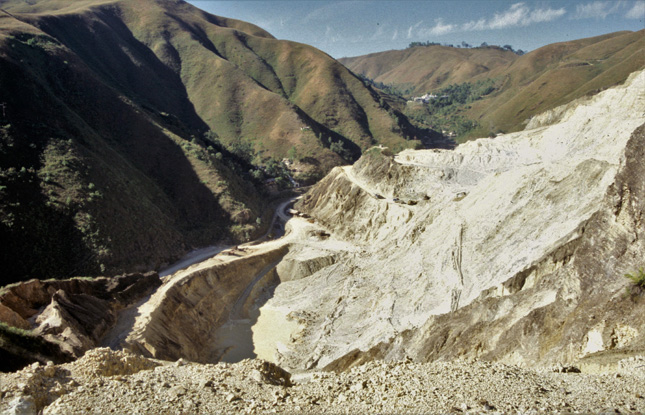-
Mining Transparency in Myanmar: Can the Extractive Industries Transparency Initiative Lead to a More Sustainable Democracy?
May 2, 2018 By Marjanneke Vijge
Myanmar is rich in natural resources—gas, oil, minerals, and gemstones—yet is still one of the world’s least developed countries. Extractive industries are the country’s most lucrative sector and the government’s main source of revenue, but most of the benefits do not reach its citizens. Instead, resource extraction in Myanmar causes severe environmental and social problems and fuels and sustains some of the country’s longstanding ethnic conflicts.
One of the main challenges in sustainably governing Myanmar’s extractive industries sector is the severe lack of government capacity, combined with high levels of secrecy and corruption. To address this, in 2013, Myanmar began implementing the Extractive Industries Transparency Initiative (EITI), a global standard for disclosing information about resource extraction. The EITI was seen as a central part of the country’s democratic reform process. The implementation of the EITI generated high hopes among civil society organizations for addressing the adverse impacts from resource extraction, though others remained skeptical.
This raises the question: Can the EITI in Myanmar lead to a more sustainable democracy with empowered civil society? In my recent article in Global Environmental Politics, I argue that the EITI in Myanmar empowers civil society, but in unexpected and unequal ways.
Transparency in Myanmar: Empowerment Through Dialogue
A common assumption is that greater transparency leads to more democratic, accountable, and inclusive governance. But it is not clear whether and how transparency standards, such as the EITI, “work” under the challenging conditions found in many developing countries, particularly in fledgling democracies such as Myanmar’s.
The EITI process has greatly enhanced opportunities for Myanmar’s civil society to voice their opinion on resource extraction. But rather than primarily benefitting from the information that is disclosed through Myanmar’s official EITI report, civil society has mostly been empowered through their participation in the process of identifying and generating information.
The EITI’s multi-stakeholder discussions were the first time in the history of Myanmar that government, civil society, and companies entered into a political dialogue. Initially, civil society organizations found it difficult to discuss transparency with the government, which had in their eyes long been responsible for human rights violations in resource extraction. Eventually, the discussions around the EITI helped build a previously unimaginable level of trust, respect, and mutual understanding between the government and civil society.
Myanmar is one of the few countries that established EITI multi-stakeholder groups at the sub-national level. These groups triggered civil society to monitor the impacts of resource extraction, sometimes in collaboration with the government and companies in their region. The EITI has allowed and facilitated civil society organizations to demand, exchange, and generate region-specific information that goes well beyond what is disclosed through the official EITI process. This even continued during the time that the official EITI process was temporarily stalled.
Transparency in Myanmar: Civil Society Disputes and Lack of Concrete Action
To organize their involvement in the EITI process, civil society organizations in Myanmar established one of the country’s first civil society networks, the Myanmar Alliance for Transparency and Accountability (MATA). MATA claims to consist of around 500 civil society organizations. While this network is a significant achievement, some accuse MATA of marginalizing and excluding ethnic and border-based groups. Others argue that civil society organizations involved in the EITI process are driven by funding opportunities and soothed by “hollow” governmental reforms.
The disputes between civil society organizations show the difficulties that arise from efforts to homogenize civil society representation in formal governance fora in Myanmar, which can impede equal representation in the EITI process. Nevertheless, MATA’s work also demonstrates the enhanced capacity of Myanmar’s civil society, and disputes can even be seen as a sign of the gradual empowerment of a diversity of voices.
While the EITI has clearly opened up avenues for civil society to demand accountability, it has also exposed the lack of appropriate accountability and legal mechanisms to address the impacts of resource extraction, as well as the country’s limited decentralization of natural resource governance. As a result, demands by civil society organizations for greater accountability have so far mostly failed to lead to concrete changes on the ground. In addition, illegal resource extraction, deeply engrained corruption, and resource extraction linked to ethnic conflicts are not yet addressed through Myanmar’s EITI process.
Paving the Way to a More Sustainable Democracy
In my article, I show that the empowering effects of transparency do not result from a linear path that leads straight from information disclosure to accountability. In the case of Myanmar, civil society is engaged and empowered mostly through the process of defining, generating, and debating transparency. Civil society uses the EITI process well beyond its official mandate by demanding, exchanging and generating information on the impacts of resource extraction. Through their involvement within and beyond the EITI process, civil society organizations build their awareness, knowledge, and capacity, as well as trust and relationships with the government and companies.
Transparency initiatives such as the EITI would benefit from focusing attention not only on which information to disclose—as is most often done—but particularly on the process of generating and disclosing information. In this way, transparency—combined with parallel reform processes and participatory approaches—can contribute to paving the way toward a more sustainable democracy.
Marjanneke J. Vijge is a former postdoctoral researcher specialized in multilevel environmental governance. She is currently employed by the Food and Agriculture Organization of the United Nations (FAO), and will soon start as Assistant Professor with the Copernicus Institute of Sustainable Development at Utrecht University.
Sources: Extractive Industries Transparency Initiative, Global Environmental Politics
Photo Credit: Bawdwin Open cast mine in Myanmar, November 1999, courtesy of Flickr user nigelmenzies.
 A Publication of the Stimson Center.
A Publication of the Stimson Center.



